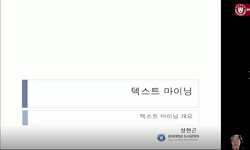The spam in the discussion web forum causes user inconvenience and lowers the value of the web forum as the open source of user opinion. The importance of postings is evaluated in terms of the number of involved authors, so the spam distorts the analy...
http://chineseinput.net/에서 pinyin(병음)방식으로 중국어를 변환할 수 있습니다.
변환된 중국어를 복사하여 사용하시면 됩니다.
- 中文 을 입력하시려면 zhongwen을 입력하시고 space를누르시면됩니다.
- 北京 을 입력하시려면 beijing을 입력하시고 space를 누르시면 됩니다.

텍스트 마이닝을 이용한 웹 포럼 불량글 탐지 모델 = The Spam Detection Model for Web Forums using Text Mining Techniques
한글로보기부가정보
다국어 초록 (Multilingual Abstract)
The spam in the discussion web forum causes user inconvenience and lowers the value of the web forum as the open source of user opinion. The importance of postings is evaluated in terms of the number of involved authors, so the spam distorts the analysis result by adding the unnecessary data in the opinion analysis. We propose the automatic detection model of spam postings in the web forum. We extract text features of posting contents using text mining techniques from the perspective of linguistics and then perform supervised learning to recognize spam from normal postings. Significant features are derived through the learning process and the automatic detection model is built based on those features. To build the automatic detection model of normal postings and spam, four evaluators are asked to recognize the spam posting in prior. We adopted the Naive Bayesian, Support Vector Machine (SVM), decision tree, which are known to perform well in data and text mining tasks. We can extract the text features to recognize the spam and detect automatically the newly posted spam. We apply the proposed model to the YahooFinace-Walmart forum, which is the world largest Walmart-related web forum.
참고문헌 (Reference)
1 Hayati P., "Toward spam 2.0: An evaluation of Web 2.0 anti-spam methods Industrial Informatics" 875-880, 2009
2 Buckland M., "The relationship between Recall and Precision" 45 (45): 12-19, 1999
3 Gruhl D., "The predictive power of online chatter" KDD 78-87, 2005
4 Vapnik VN., "The nature of statistical learning theory" Springer-Verlag 1995
5 Gillin P., "The New Influencers, A Marketer’s Guide to the New Social Media" Quill Driver Books\Word Dancer Press 2007
6 Robert F., "Syntax. Critical Concepts in Linguistics" Routledge 2006
7 Dunning T., "Statistical Identification of Language" New Mexico State University 94-273, 1994
8 Lin Y., "Splog detection using self-similarity analysis on blogtemporal dynamics" 2007
9 Jindal N., "Opinion Spam and Analysis" WSDM’08 2008
10 Lewis D., "Naive (Bayes) at forty: The independence assumption in information retrieval" Machine Learning 4-15, 1998
1 Hayati P., "Toward spam 2.0: An evaluation of Web 2.0 anti-spam methods Industrial Informatics" 875-880, 2009
2 Buckland M., "The relationship between Recall and Precision" 45 (45): 12-19, 1999
3 Gruhl D., "The predictive power of online chatter" KDD 78-87, 2005
4 Vapnik VN., "The nature of statistical learning theory" Springer-Verlag 1995
5 Gillin P., "The New Influencers, A Marketer’s Guide to the New Social Media" Quill Driver Books\Word Dancer Press 2007
6 Robert F., "Syntax. Critical Concepts in Linguistics" Routledge 2006
7 Dunning T., "Statistical Identification of Language" New Mexico State University 94-273, 1994
8 Lin Y., "Splog detection using self-similarity analysis on blogtemporal dynamics" 2007
9 Jindal N., "Opinion Spam and Analysis" WSDM’08 2008
10 Lewis D., "Naive (Bayes) at forty: The independence assumption in information retrieval" Machine Learning 4-15, 1998
11 Morinaga S., "Mining product reputations on the Web" 341 : 2002
12 Zinman A., "Is Britney Spears spam" 2007
13 Quinlan JR., "Induction of decision trees. In Machine Learning"
14 Benevenuto F., "Identifying Video Spammers in Online Social Networks" AIRWeb 2008
15 Gwet K., "Handbook of Inter-Rater Reliability (Second Edition)" ISBN 2010
16 Sampson S., "Gathering customer feedback via the Internet: instruments and prospects" 98 (98): 71-, 1998
17 Glance N., "Deriving Marketing Intelligence from Online Discussion" KDD 2005
18 Han S., "Collaborative blog spam filtering using adaptive percolation search" WWW 2006
19 Mishne G., "Blocking Blog Spam with Language Model Disagreement" AIRWeb 2005
20 Wanas N., "Automatic Scoring of Online Discussion Posts" WICOW 2008
21 Paul K., "Analyzing Grammar: An Introduction" Cambridge University Press 35-, 2005
22 Wenger A., "Analysis of travel bloggers' characteristics and their communication about Austria as a tourism destination" 14 (14): 2008
23 Liu Y, "ARSA: A Sentiment-Aware Model for Predicting Sales Performance Using Blogs" SIGIR 2007
24 Niu Y., "A Quantitative Study of Forum Spamming Using Context-based Analysis" 2007
동일학술지(권/호) 다른 논문
-
비실시간 웹 토론에서 학습자의 내·외향성이 몰입과 만족도에 주는 차이 분석
- 한국지식정보기술학회
- 김태웅
- 2012
- KCI등재
-
- 한국지식정보기술학회
- 김상연
- 2012
- KCI등재
-
- 한국지식정보기술학회
- 안성옥
- 2012
- KCI등재
-
- 한국지식정보기술학회
- 김완규
- 2012
- KCI등재
분석정보
인용정보 인용지수 설명보기
학술지 이력
| 연월일 | 이력구분 | 이력상세 | 등재구분 |
|---|---|---|---|
| 2028 | 평가예정 | 재인증평가 신청대상 (재인증) | |
| 2022-01-01 | 평가 | 등재학술지 유지 (재인증) |  |
| 2019-04-09 | 학회명변경 | 영문명 : 미등록 -> Korea Knowledge Information Technology Society |  |
| 2019-01-01 | 평가 | 등재학술지 유지 (계속평가) |  |
| 2016-01-01 | 평가 | 등재학술지 유지 (계속평가) |  |
| 2014-03-17 | 학술지명변경 | 외국어명 : Journal of The Korea Knowledge Information Technology Society -> Journal of Knowledge Information Technology and Systems |  |
| 2012-01-01 | 평가 | 등재학술지 선정 (등재후보2차) |  |
| 2011-01-01 | 평가 | 등재후보 1차 PASS (등재후보1차) |  |
| 2009-01-01 | 평가 | 등재후보학술지 선정 (신규평가) |  |
학술지 인용정보
| 기준연도 | WOS-KCI 통합IF(2년) | KCIF(2년) | KCIF(3년) |
|---|---|---|---|
| 2016 | 0.39 | 0.39 | 0.29 |
| KCIF(4년) | KCIF(5년) | 중심성지수(3년) | 즉시성지수 |
| 0.25 | 0.22 | 0.312 | 0.07 |




 KCI
KCI






